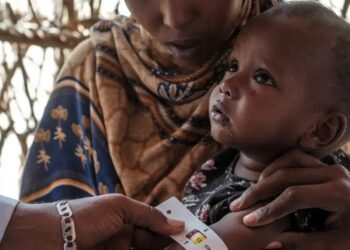Save the Children has issued a warning that approximately 230,000 children and women, including pregnant women, in Sudan are at risk of death due to starvation unless urgent funding is provided to address the massive crisis in the country. Despite the worsening humanitarian situation, emergency nutrition program funding in Sudan has only reached 5.5% of the total required. Over 2.9 million children in Sudan are suffering from acute malnutrition, according to a joint report by the United Nations, the Sudanese Ministry of Health, and various NGOs. Among these children, over 100,000 are likely to face severe medical complications requiring intensive hospital care to survive.
The organization forecasts that around 222,000 children with acute malnutrition and over 7,000 new mothers could die in the coming months if their nutritional and health needs are not met. This prediction is based on the current funding levels for the emergency nutrition program in Sudan, which currently covers only 5.5% of the country’s total needs, down from 23% last year. Without addressing the funding gap, approximately 1.2 million pregnant and lactating women could suffer from malnutrition this year, leading to severe health complications during and after childbirth.
Experts from Save the Children have observed pregnant women skipping meals and going to bed hungry to allow their children to eat, significantly reducing the nutrients available for their unborn children and raising serious concerns about the health of these children at birth. The destruction of the supply chain for therapeutic food, crucial for treating children with acute malnutrition, has hindered the response to the crisis, especially after the only company manufacturing these foods was destroyed during last year’s conflict.
Since the outbreak of war in Sudan in mid-April last year, food production has collapsed, imports have stopped, and the prices of basic food items have increased by 45% in less than a year. Restrictions on the movement of food across the country, especially in rural areas, have pushed more than 37% of the population to higher levels of starvation, with many civilians fleeing from cities to villages due to escalating battles.
The country director for Save the Children in Sudan, Arif Noor, stated that the cycle of hunger is worsening with no end in sight, especially after the conflict extended to Al Jazirah State, the country’s breadbasket, causing unprecedented disruption in food production. Noor emphasized the dire situation, stating, “We are witnessing immense hunger, suffering, and death in Sudan while the world looks away,” and called on the international community to act to prevent further loss of life.
Save the Children has appealed to the international community to allocate funding and resources for a large-scale response to meet the critical needs in Sudan. The organization also urged the conflicting parties in Sudan to end the conflict and allow unrestricted access to humanitarian aid to provide families and children with food, health, and other life-saving services and supplies.
The ongoing conflict in Sudan has led to one of the world’s largest displacement crises, affecting around 9 million people, while another 25 million face severe food insecurity.
Intense fighting continues to damage water supply networks and other vital civilian infrastructure, with nearly three-quarters of health facilities in conflict-affected states out of service. The UN’s initial estimates suggest that more than 10,000 Sudanese have been killed, though the actual number of casualties is likely much higher due to military operations hindering accurate counts of the dead and injured in conflict zones.






